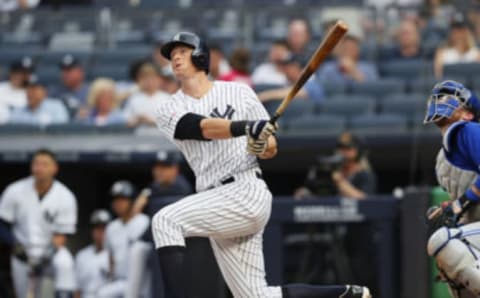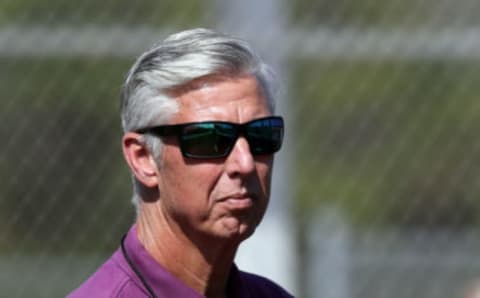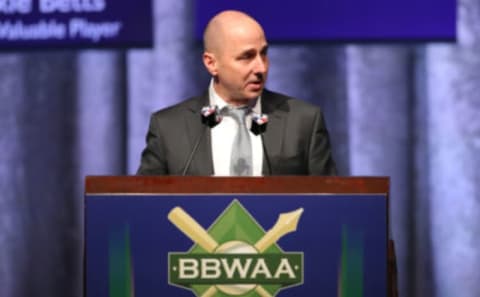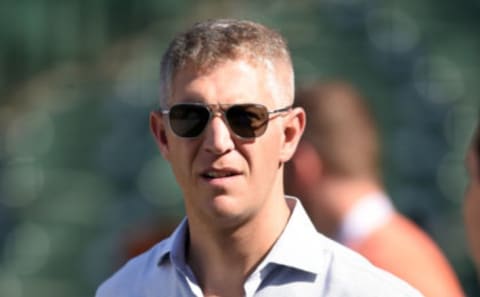2019 MLB Season: Ranking the AL East General Managers


Erik Neander has maneuvered the Tampa Bay Rays into a contending position during the 2019 MLB season
Wonder why the Tampa Bay Rays have been able to hang so closely to the New York Yankees in the AL East? Look no further than the job done this off-season by Rays general manager Erik Neander.
Neander’s various personnel moves have improved the Rays by 7.9 Wins Wins Above Average through the mid-season. That is the best performance by any general manager in MLB.
It’s also significantly better than any other GM in the division, including Yankees’ GM Brian Cashman or Dave Dombrowski, president and GM of the world champion Boston Red Sox.
This is the last of six articles through the All Star break looking at the impacts of general manager moves. Teams are analyzed on a division-by-division basis. WAA is the preferred method of assessment because it possesses all the statistical advantages of WAR while being pegged to the average performance of a current major league player rather than to a replacement player. That means an average score is, quite conveniently, 0.0.
Because teams are judged only on the basis of moves made since the end of the previous season, the assessment won’t necessarily mirror the standings. Some teams are populated principally by players contractually obligated to the team since before the end of the 2018, meaning their performances do not figure into this rating.
All we are interested in here is the impact of personnel decisions made since the end of the 2018 season. Those decisions could take several forms: acquiring a player by trade or sale, trading or selling a player, signing a free agent, extending a player already on your team to a new contract carrying into his normal free agent years, or allowing a player to leave via free agency.
Use of players who retain rookie status also counts.
From best to worst, here’s how the GMs of the five AL East teams have done to date.

1. Erik Neander, Tampa Bay Rays, +7.9
Two moves, neither of them heralded, made Neander’s off-season.
In December, Neander signed Charlie Morton to a three-year, $45 million deal to co-headline the Rays rotation behind Matt Snell. Snell is having only a so-so- season, but Morton has produced a 9-2 record and a league-leading 2.36 ERA in 18 starts. That translates to 2.4 WAA.
He also tied up promising infielder Brandon Lowe through 2026 with a contract that costs only $1 million this season, but which eventually will rise to $11.5 million. Lowe has justified the team’s faith with a .276 average, 16 home runs and a 1.8 WAA.
His overall +4.9 WAA in free agent signings/re-signings is bettered only by Brian Cashman’s +5.0.
Neander swung a pair of three-way trades over the winter, and both are bearing fruit.
A December deal with Cleveland and Seattle brought Yandy Diaz to Tampa at a cost of Jake Bauers. Diaz has been worth +1.0 WAA to Tampa while Bauers has a -1.6 WAA for the Indians.
A separate three-way trade involving Texas and Oakland netted the Rays reliever Emilio Pagan (+1.0 WAA) at a cost of lightly used reliever Kyle Bird.
Overall, Neander made moves impacting 21 current or former Rays since the end of the 2018 season, and two-thirds of those moves have so far worked to the team’s benefit.

2. Dave Dombrowski, Boston Red Sox, +3.6
Dombrowski’s mid-season score is inflated mostly by the departures of several marginal players who tried to trade on the team’s World Series success and have flopped with their new teams. Joe Kelly, Drew Pomeranz, Blake Swihart and Ian Kinsler all were traded away or left on their own, only to produce negative impacts.
The cumulative impact of departures from Boston helps Dombrowski’s score by 5.0 WAA. Translation: Considering only the players Boston’s GM brought in to town, he has hurt the club.
Boston’s president of baseball operations and GM imported 20 players via trade, signing, re-signing or promotion. Only one, rookie reliever Brandon Workman, has produced a WAA in excess of +0.4.
Most of Dombrowski’s winter involved negotiations to address Boston’s bullpen concerns. He did take time to sign Nathan Eovaldi, the team’s World Series pitching hero, to a four-year, $68 million contract. But Eovaldi made only four starts before undergoing elbow surgery. That big dollar move has thus far netted Boston just -0.2 WAA.
Workman’s 7-1 record and 1.70 ERA in 40 games has helped. But the absence of 2018 closer Craig Kimbrel remains conspicuous.
Dombrowski re-signed catcher Christian Vazquez for three years and thus far has gotten +0.4 WAA. But Steve Pearce, brought in to beef up the offense, was batting only .180 with a -0.6 WAA and reduced to limited duty when he went on the injured list at the end of May.

3. Brian Cashman, New York Yankees, -0.3
The sensory reaction is that Cashman had a great off-season. His team is sailing along atop the AL East, D J LeMahieu, Zack Britton and Adam Ottavino have been free agent steals, and James Paxton – If not dominant – has at least been a competent starter.
Give Cashman all that and you’ve accorded him +4.7 WAA as a head-start. The rest of Cashman’s off-season, though, hasn’t gone as well.
Aside from Paxton, he traded for seven players, among them the highly publicized acquisition last month of Edwin Encarnacion. The cumulative impact of those seven players has been -1.8 WAA.
He’s used five rookies for a cumulative impact of -0.9.
If the Yankees have one perennial need, it’s for starting pitching. Yet Cashman let Lance Lynn escape to Texas on a three-year, $30 million deal. There, Lynn has run up a 10-4 record in 17 starts, good for a 2.5 WAA.
Fortunately, Cashman’s still working from a core which, even though unhealthy, includes Aaron Judge, Gary Sanchez, Didi Gregorious, Giancarlo Stanton, Masahiro Tanaka, Aroldis Chapman and the rest. In concert, they make New York a solid first place team and the consensus pick as the American League’s best.
The bottom line is this: Cashman’s off-season had some big highlights, capped by the signing of LeMahieu. Overall, though, it wasn’t an especially good off-season….nor did it have to be.

4. Ross Atkins, Toronto Blue Jays, -3.9
When you’re in a division with the World Series champs and the Yankees, you have to take a few chances. Atkins did this past off-season, and so far the gambles haven’t paid off.
Atkins’ trade ledger tells the tale. Any of the deals individually look just so-so, but as a group they have sapped five games from Toronto’s talent base.
The May deal that sent center fielder Kevin Pillar to San Francisco for Alan Hanson and Derek Law has been typical. Pillar hasn’t helped the Giants, his WAA to this point is -0.3. But Hanson and Law have a collective -1.5 for the Jays.
Multiply that result by each of the team’s trades and it does not add up to improvement.
The big headlines in Toronto, of course, have involved the callups of mega-rookies Vlad Guerrero Jr. and Cavan Biggio. These may some day be the genius-level decisions many project them to be, but that isn’t the story yet. Guerrero is batting .248 with a mediocre .744 OPS, good for a -0.1 WAA. Biggio has had the better of it, but his .250 average and .835 OPS only add up to a +0.6 WAA.
The third big-name rookie, Rowdy Tellez, is hitting .231.
The hope for Jays fans is that this is indeed a learning year, in which case Atkins’ numbers may be meaningless.

5. Mike Elias, Baltimore Orioles, -4.9
Nobody expected anything from Elias when he was hired last fall to breathe new life into the moribund Orioles. He will be judged on what happens in the next several seasons, this one eventually being viewed only as a groundwork-laying term.
More from Call to the Pen
- Philadelphia Phillies, ready for a stretch run, bomb St. Louis Cardinals
- Philadelphia Phillies: The 4 players on the franchise’s Mount Rushmore
- Boston Red Sox fans should be upset over Mookie Betts’ comment
- Analyzing the Boston Red Sox trade for Dave Henderson and Spike Owen
- 2023 MLB postseason likely to have a strange look without Yankees, Red Sox, Cardinals
He appears to have uncovered one nugget. Rookie John Means has made 18 appearances, 14 of them as a starting pitcher, with a 7-4 record that represents 28 percent of all the Orioles’ wins. His next victory will equal the best total by any Oriole pitcher all of last season.
Means has allowed just 67 hits in 83 innings with a 2.6 WAA. If he finishes the season with that lofty a WAA, he’ll be the first Oriole pitcher to do so since Zack Britton in 2016.
It wouldn’t be fair to expect much more of Elias, and he hasn’t delivered it either. Aside from Means, his eight other rookie callups have combined for a -4.2 WAA. There would be no point in dipping deeply into the free agent market, and Elias didn’t. The four guys he did sign, each a bargain basement pickup, have combined for -1.9 WAA.
Next. Ranking the NL East GMs. dark
He picked up 10 players via trades or purchases in the hope that one or two might eventually blossom. The best bets may be either Dwight Smith Jr. (-1.2) or Rio Ruiz (-0.8), both of whom are getting regular time.